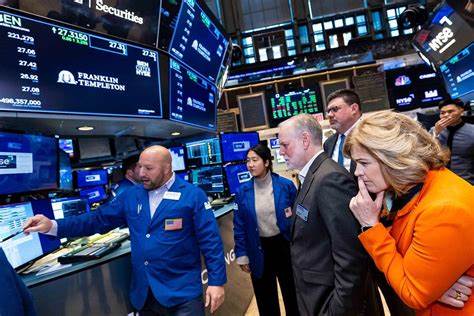On Friday, the US stock market witnessed a day of mixed fortunes, characterized by significant movements across major indices and standout performances from specific sectors and companies. The Dow Jones Industrial Average faced notable headwinds, plummeting by 300 points, or 0.8%, as market participants reacted to fresh data on inflation and consumer sentiment. This downturn reflected concerns among investors about the economic outlook, particularly in light of unexpected shifts in consumer confidence.
In contrast, the broader indices showed a more nuanced picture: the S&P 500 slipped by 0.4%, while the Nasdaq Composite, which is heavily weighted towards technology stocks, edged marginally lower by 0.1% during morning trading. These indices had previously posted strong performances, with both achieving record highs earlier in the week. The divergence between the Dow’s decline and the relatively stable performance of tech-focused indices underscored the sectoral variations within the market.
One standout exception to the day’s downturn was Adobe Systems, a leader in artificial intelligence and digital creativity software. Adobe’s shares surged impressively by more than 15% following its stellar earnings report for the fiscal second quarter. The company exceeded analyst expectations and raised its full-year outlook, buoyed by robust demand for its creative and marketing software solutions. Adobe’s strong performance not only bolstered investor confidence but also highlighted the resilience and growth potential of tech companies amid broader market volatility.
The University of Michigan’s consumer sentiment index delivered unexpected disappointment, falling sharply to 65.6 in June from 69.1 in May, contrary to expectations of a modest increase to 73.0. This index, which also includes inflation forecasts, indicated that consumers were more cautious than anticipated, potentially signaling concerns about economic uncertainties and rising living costs.
Market analysts noted that the Dow Jones Industrial Average had extended its losing streak to three consecutive sessions by the end of Thursday, declining by 0.2%. In contrast, the S&P 500 and Nasdaq Composite had achieved fresh record closing highs, albeit with varying degrees of resilience across different sectors. The small-cap Russell 2000 index, typically considered a barometer of domestic economic sentiment, faced a sharper decline of 0.9%, closing just at its 50-day moving average, indicating increased volatility in smaller-cap stocks.
Looking ahead, the market remains attuned to evolving economic indicators and signals from the Federal Reserve regarding monetary policy. Investors are particularly focused on inflation trends and the potential impact on interest rate decisions, with recent data suggesting a nuanced outlook on consumer spending and economic resilience. The strength seen in tech stocks, driven by advancements in artificial intelligence and positive corporate earnings like Adobe’s, underscores ongoing investor confidence in sectors poised for growth amid broader economic uncertainties.
In commodities trading, oil prices continued their upward trajectory, supported by recent strong gains, with West Texas Intermediate futures hovering around $79 per barrel. Concurrently, the 10-year Treasury yield saw a modest decrease to 4.22% early Friday, reflecting ongoing market adjustments to economic data and Fed policy signals.
Overall, Friday’s trading session highlighted both the challenges and opportunities present in today’s market landscape. Specific stocks and sectors, such as Adobe in technology, demonstrated resilience and growth potential amidst broader market volatility influenced by economic data releases and shifts in investor sentiment.
